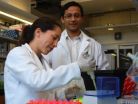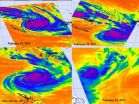(Press-News.org) Alcoholism is a tough addiction to kick. Eventually, most people return to drinking. But some Dutch and German psychological scientists have tested a short-term regime that promises to help alcoholics stay sober. Their study is published in Psychological Science, a journal of the Association of Psychological Science.
Heavy drinkers tend to behave impulsively in response to temptation. Meanwhile, their "reflective," or controlled, responses—the thoughts that would help them resist drinking—are often weak. Most therapies, including Cognitive Behavior Therapy, primarily address the reflective responses. "They deal with the reasons and strategies" for sobriety, said University of Amsterdam experimental psychologist Reinout W. Wiers, the study's lead author. To boost treatment success, his team developed cognitive-bias modification, or CBM, which, for the first time, "tries to turn around those impulsive responses."
This newly developed CBM variety employs video-game-like "approach-avoidance tasks": pushing or pulling a joystick in response to images on a screen. Pulling zooms in on the image, as if the participant were "approaching" it. Pushing zooms out, in "avoidance." The team's earlier studies found that heavier drinkers, shown images of alcoholic beverages or soft drinks, are faster to "pull" the alcohol than lighter drinkers—but CBM can turn this "approach bias" into an "avoidance bias."
Could CBM help serious alcoholics? In this study Wiers and his collaborators—Carolin Eberl and Johannes Lindenmeyer of the Salus Clinic in Lindow, Germany, and Mike Rinck and Eni S. Becker of Radboud University—recruited 214 inpatients at the Salus Clinic. Three weeks after detoxification, the patients were assessed for their craving for alcohol, as well as their attraction to it, indicated by joystick and word-association tasks.
One group of patients then received CBM: they were trained to push away pictures of alcoholic drinks. The control groups either received "sham" training or none at all. Four 15-minute sessions were conducted on four consecutive days.
When retested a week later, the CBM participants' "approach bias for alcohol had changed to an avoidance bias, on a variety of tests," said Wiers. The control groups showed no such changes.
Then the patients began abstinence-based cognitive behavior therapy, a structured method that helps people identify and challenge the thinking patterns that perpetuate their self-destructive behaviors. Treatment lasted about three months. A year later, the researchers assessed the patients' success in staying sober.
As is typical, many patients had relapsed—but only 46 percent of the CBM trained group, compared with 59 percent of the others. Although the researchers cannot be absolutely sure that CBM made the difference, joystick and word tests left them "strongly confident," said Wiers, that "adding this intervention to regular treatment helps people stay abstinent."
One still-abstinent patient told a story illustrating this point. At a party, looking for a Coke, the man opened the refrigerator, but found it full of beer. "Immediately, he made the push movement"—he closed the door. "In the heat of the moment, when temptations is high, you have to take that immediate first step in the right direction or it becomes very difficult," commented Wiers. "CBM helps people take this step, before they have time to consciously think, 'Should I take a drink?'"
###
For more information about this study, please contact Reinout W. Wiers at r.wiers@uva.nl.
The APS journal Psychological Science is the highest ranked empirical journal in psychology. For a copy of the article "Retraining Automatic Action Tendencies Changes Alcoholic Patients' Approach Bias for Alcohol and Improves Treatment Outcome" and access to other Psychological Science research findings, please contact Keri Chiodo at 202-293-9300 or kchiodo@psychologicalscience.org.
END
Mild heart failure patients with a particular condition that results in disorganized electrical activity throughout the heart benefit substantially from cardiac resynchronization therapy with defibrillator (CRT–D), according to a study published in the American Heart Association journal Circulation.
In patients with the condition, known as left bundle branch block or LBBB, CRT-D therapy reduced heart failure progression and the risk of ventricular tachyarrhythmias, fast and potentially life-threatening heart rhythms. Heart failure patients without LBBB did not receive ...
Many people suffer from a devastating condition known as critical limb ischemia (CLI) that can lead to muscle wasting and even amputation. The disease is linked to the blockage of blood flow to the skeletal muscle and current treatment options include rehabilitative exercise and surgical bypass of blood vessels. New preclinical research suggests there may be a way to restore blood supply in skeletal muscle without traditional intervention.
Scientists at The University of Texas Health Science Center at Houston (UTHealth) and the Salk Institute for Biological Studies ...
WASHINGTON, March 1—The world's largest international conference on
optical communications will take place March 6-10 at the Los Angeles Convention Center. The Optical Fiber Communication Conference and Exposition/National Fiber Optic Engineers Conference (OFC/NFOEC) is the premier telecom meeting where experts from industry and academia share their results, experiences, and insights on the future of electronic and wireless communication and optical technologies. More than 10,000 attendees and an exhibit with 500 companies are expected.
CONFERENCE HIGHLIGHTS
Plenary ...
An AIDS vaccine tested in people, but found to be ineffective, influenced the genetic makeup of the virus that slipped past. The findings suggest new ideas for developing HIV vaccines.
The results were published Feb. 27 in Nature Medicine.
This is the first evidence that vaccine-induced cellular immune responses against HIV-1 infection exert selective pressure on the virus. "Selective pressure" refers to environmental demands that favor certain genetic traits over others.
The senior author of the multi-institutional study is Dr. James I. Mullins, University of Washington ...
Tropical Cyclone Atu had a brief but memorable life last week, and NASA's Atmospheric Infrared Sounder (AIRS) instrument that flies aboard NASA's Aqua satellite captured a day-by-day look at its growth and death.
AIRS provides infrared images of atmospheric phenomena, oceans and land areas around the world. Basically, infrared data takes the temperature of these things. When NASA's Aqua satellite flew over Tropical Cyclone Atu from February 21 through the 25 it saw thunderstorm cloud tops grow colder as the clouds grew higher and thunderstorms became more powerful. When ...
WASHINGTON -- NASA's Glory spacecraft is scheduled for launch on Friday, March 4. Technical issues with ground support equipment for the Taurus XL launch vehicle led to the scrub of the original Feb. 23 launch attempt. Those issues have been resolved.
The March 4 liftoff from Vandenberg Air Force Base, Calif., is targeted for 5:09:43 a.m. EST, in the middle of a 48-second launch window. Spacecraft separation occurs 13 minutes after launch.
Data from the Glory mission will allow scientists to better understand how the sun and tiny atmospheric particles called aerosols ...
INDIANAPOLIS – Tanning bed exposure can produce more than some tanners may bargain for, especially when they self-diagnose and use the radiation to treat skin eruptions, according to research conducted by the Indiana University School of Medicine Department of Dermatology.
"There are many reasons to be cautious of tanning bed radiation but some people use tanning beds to 'self-treat' skin eruptions," said Jeffrey B. Travers, M.D., Ph.D., senior author of a study published online in the Archives of Dermatology. "If the skin eruption is eczema or even psoriasis, a tanning ...
Indiana University scientists have solved a perplexing mystery regarding one of the body's main energy storage molecules, in the process shedding light on a possible route to treatment of a rare but deadly disease in teenagers.
The disease occurs when a genetic mutation causes excessive amounts of phosphate to build up in glycogen. Glycogen is a chain-like molecule the body uses to temporarily store glucose when it's not needed to provide energy for cellular activities. The excess phosphate causes unnatural glycogen structures to appear in the body, including the brain, ...
BUFFALO, N.Y. -- When a disaster's physical evidence is gone -- debris removed, shooter arrested, ashes cold -- the psychological effects of the disaster on emergency responders and civilians involved still may burn.
Emergency mental health, a field often overlooked in the chaos, is a vital component of any disaster response, but may not be well represented in emergency preparedness planning.
Trained mental health responders to the Continental Flight 3407 disaster outside Buffalo in 2009 share their lessons learned on mental health preparedness in an article that ...
Guojun Liu has discovered a way to use nanotechnology to reduce friction in automobile engines and machines.
"The technology should be useful in a wide range of machineries other than automobile engines," says Dr. Liu, a professor in the Department of Chemistry and an expert in polymer synthesis. "If implemented industrially, this nanotechnology should help prolong machine life and improve energy efficiency."
Dr Liu's team prepared miniscule polymer particles that were only tens of nanometers in size. These particles were then dispersed in automobile engine base oils. ...





